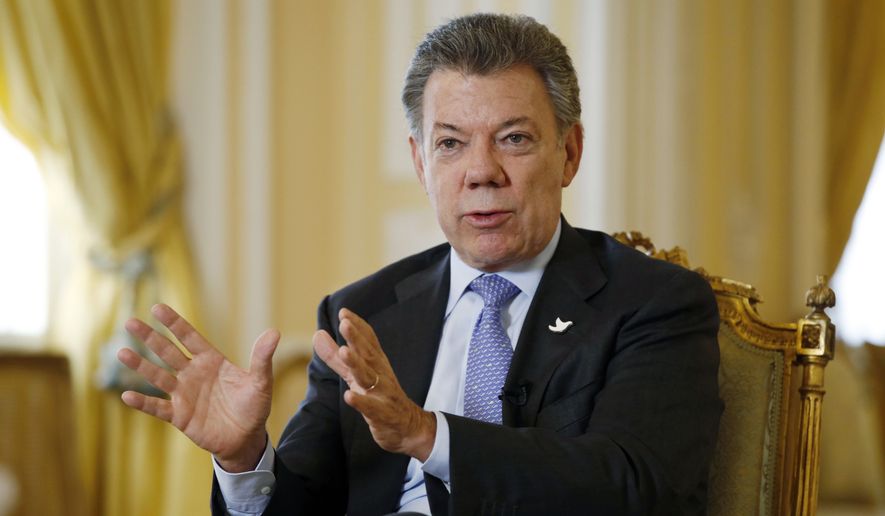The White House threw its weight behind Colombia’s push for a major peace accord with leftist FARC rebels Tuesday, announcing that President Obama will ask Congress to ramp up security-related aid to the South American nation if a final deal gets signed in the months ahead.
While officials refused to discuss specific numbers, they said the new aid plan will be center stage when Colombian President Juan Manuel Santos visits the White House Thursday and will exceed Washington’s current assistance under the long-running Plan Colombia program, which has been in the $280 million range annually during recent years.
The announcement comes ahead of a March 23 target for the formal end of hostilities between the Colombian government and the FARC — the Spanish acronym for the Revolutionary Armed Forces of Colombia — that has killed 220,000 people and displaced millions since 1964. It’s the longest-running conflict in the hemisphere.
During a conference call with reporters, administration officials said Mr. Obama wants to build off the success of Plan Colombia, which has channeled some $10 billion to Bogota since 2000, targeting funds for counter-narcotics and other initiatives in the Colombian countryside.
Assistant Secretary of State for Western Hemisphere Affairs Roberta Jacobson said a significant portion of the new funding will go toward building the legal system and other government institutions in rural areas of Colombia that will no longer be under FARC control if the peace accord holds.
The FARC, originally founded as a Marxist peasant insurgency, is believed to control some 60 percent of the nation’s illicit cocaine trade and concerns are high the group won’t relinquish its main source of income under the peace deal.
Regional analysts say Bogota may lack the resources to prevent parts of the Colombian countryside from slipping toward the kind of criminal anarchy gripping other corners of Latin America where peace deals with leftist guerrillas have been struck in recent decades, including El Salvador and Guatemala.
Bernard Aronson, Mr. Obama’s special envoy to the Colombian crisis, told reporters Tuesday the U.S. wants to make sure that a potential security vacuum following the peace accord is not “filled by criminal gangs.”
Despite many previous setbacks, regional experts say a long-elusive peace deal is expected to stick this time.
The U.N. Security Council last week unanimously approved a political mission to monitor and verify a proposed cease-fire, acting at the request of both the government in Bogota and the rebels.
But the FARC has been on Washington’s official Foreign Terrorist Organizations list since 1997, and it was unclear Tuesday how quickly the Obama administration intends to act toward lifting the designation.
While lawmakers on both sides are expected to support the Obama administration’s proposal for increased aid to Bogota, some have criticized Cuba’s prominent role as a mediator in the peace process.
SEE ALSO: Paul Ryan raises visa waiver program in first meeting with Obama
Havana has been seen as essential to the peace talks, and the Obama administration has suggested recent breakthroughs toward a final deal are linked to Mr. Obama’s own pursuit of a diplomatic detente with the leftist Castro regime in Cuba, which long backed the FARC.
And some conservatives in Colombia — led by former President Alvaro Uribe — remain deeply critical of the peace process. They argue the Santos government has made dangerous concessions to the FARC, offering what amounts to legal immunity to guerrillas accused of atrocities during the five-decade conflict in exchange for a promise by the rebel group to lay down its arms.
The Obama administration said Tuesday that part of Mr. Santos’ visit this week will involve a ceremony commemorating the 15-year anniversary of Plan Colombia. While a host of current and former U.S. and Colombian officials will be on hand, the White House said Mr. Uribe won’t be there.
• Guy Taylor can be reached at gtaylor@washingtontimes.com.




Please read our comment policy before commenting.